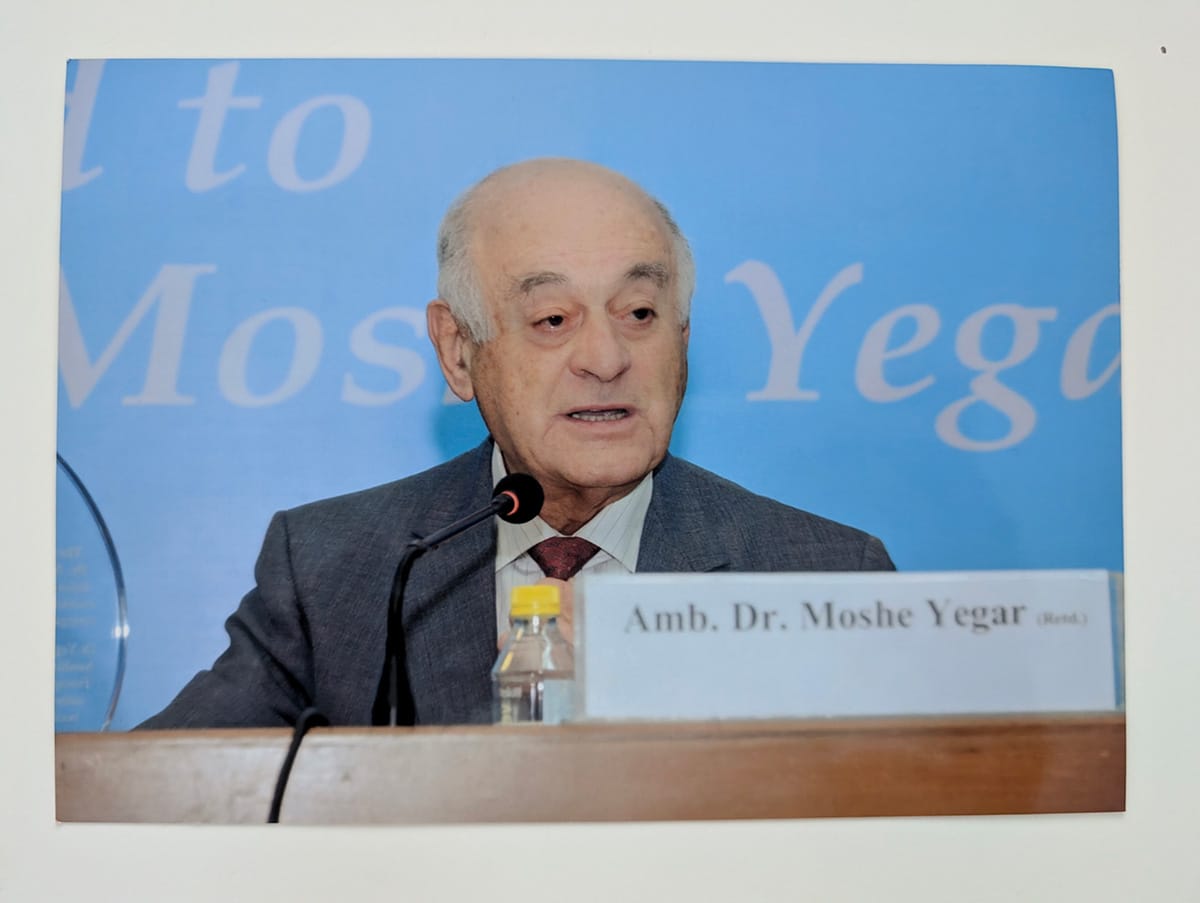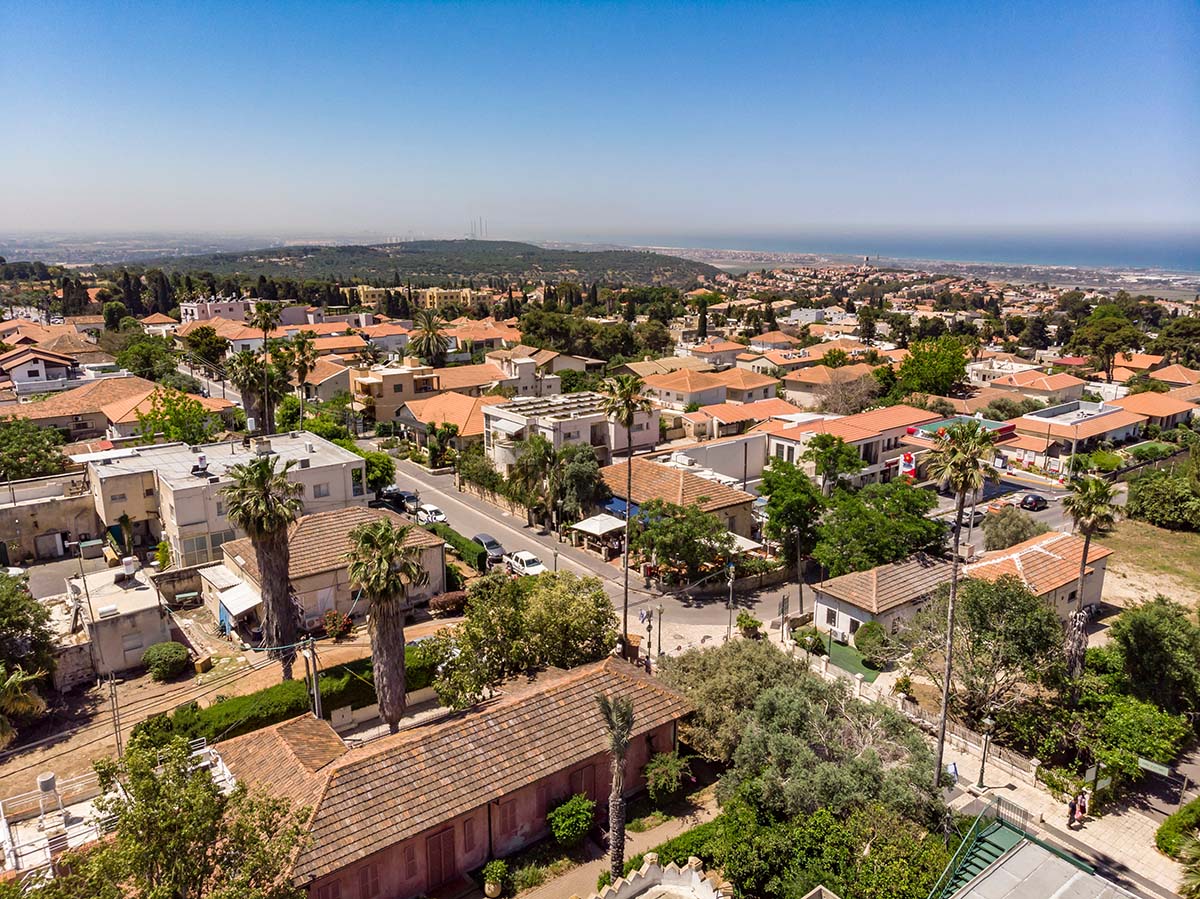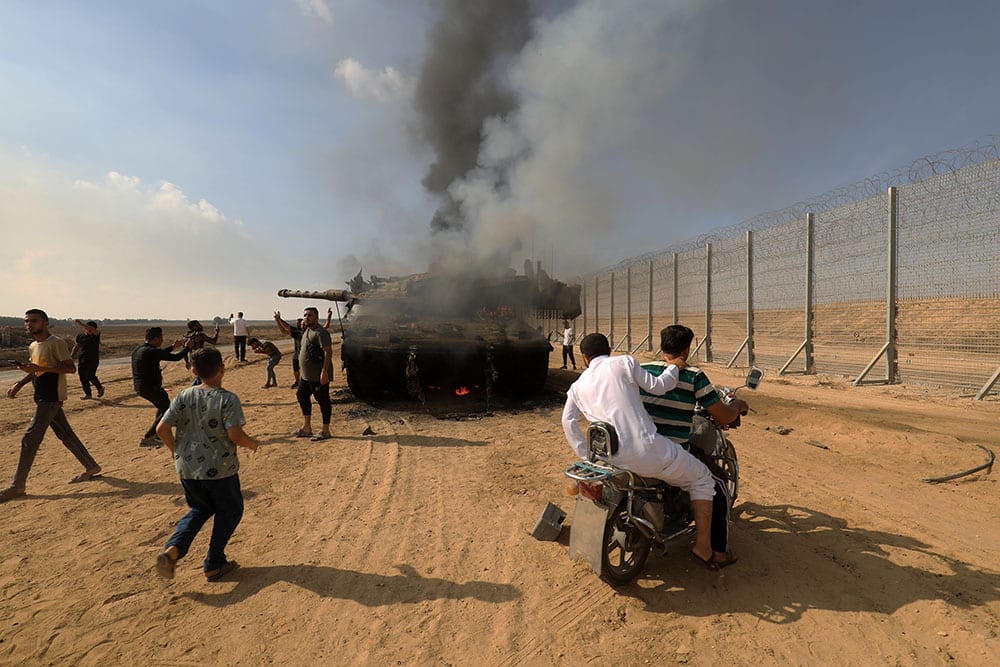
Dr. Moshe Yegar’s home, in Jerusalem, tells a story. There are photos from diplomatic occasions around the world. There are certificates of appreciation and prizes relating to his diplomatic and academic work, including the Jabotinsky Prize for Literature and Research and a special prize for his part in establishing Israeli–Indian relations. In his rich library, 20 books may be found that he wrote in Hebrew. Several of them have been translated into other languages, and four more were written originally in English. Most of them deal with history and with the diplomatic side of Israel’s international relations.
A new immigrant who spoke Hebrew better than the sabras
Dr. Moshe Yegar was born in 1930, and at age 94 he still has his vim. We met him at his home to hear about his 40 years of service at the Ministry of Foreign Affairs and about his perspective on the present situation. It was a special interview with a special person who had occasion to work under such figures as Golda Meir, Abba Eban, Yigal Alon, Yitzhak Rabin, and Yitzhak Shamir, among others. But we should start at the beginning.
Moshe, let’s go back to 1935. You arrived in Israel from — where?
We came from Argentina when I wasn’t yet five. My father was a Hebrew teacher, and he was sent to teach in Zichron Yaakov. I started kindergarten as a new immigrant, but my Hebrew was correct and graceful thanks to my father. From the day I was born, he’d spoken only Hebrew to me, even before we came to Israel. We lived in Zichron Yaakov for five years, and those years left a deep impression on me.

Did you join the Haganah?
I was a member of the youth brigades in the Haganah for two years. When the War of Independence began as soon as independence was declared, my fellow members and I were recruited into the IDF. I was one of the trainers for the scouts movement, and we were among the founders of the Nahal — together with the United Nahal Movement. We also founded Kibbutz Tel Katzir.
Did you consider continuing into a military career?
At a certain point I left Tel Katzir and went back to being an enlisted man in the IDF. I was in the Nahal’s first NCO course. I also took a Master Sergeant course and I was appointed master sergeant for the Nahal’s first company of privates. I was also sent for paratrooper training, and then to the eighth round of the officer training course. Afterward I was discharged from the IDF and I went to study at the Hebrew University.
And then it was straight out of the university into a diplomatic career?
After my bachelor’s degree in modern Middle Eastern history, political science, and general history, I went on to study for a master’s. But I wanted to join the Ministry of Foreign Affairs and in the end, I passed the qualifying exam for cadets. That was the third time it was given, in 1956. In the next 40 years, I held various positions in Israel and in Israeli missions abroad. I finished up my master’s while I was an emissary in Burma.
So was it your time in Burma that prompted you to become an expert in Asian Islam?
Because the Hebrew University wasn’t teaching Asian Islam at that time, I received special permission to write a thesis on Burma’s Muslim minority. Afterward, I researched Islam in British Malaya, which is Malaysia today. That was my doctorate. I worked for about twenty years, in my spare time, on a comparative study of Muslim uprisings in Burma, Thailand, and the Philippines.
The Bible as key to diplomatic ties
During his 40 years of diplomatic service, Dr. Yegar filled significant roles around the world. After his service in Malaysia, he was a consul in Los Angeles and consul general in Philadelphia. Among his various assignments in Israel, he was head of public diplomacy and of the Asian division at the Ministry of Foreign Affairs. He participated in Operation Solomon (the airlift of Ethiopian Jews) and played a central role in establishing Israel’s relations with India and other Asian and African nations, besides serving terms as ambassador to Sweden and to the Czech Republic.
You held positions under several Foreign Ministers. What are the specifics?
When I was deputy head of the Asian division and Abba Eban was Foreign Minister, he appointed me to head the training department. When Yigal Alon was Foreign Minister, he appointed me department head for public diplomacy, and when Yitzhak Shamir was Foreign Minister, he appointed me division head for public diplomacy. I held that job for five years.
You developed a special cultural project in the Czech Republic. Tell us about it.
After the communist regime collapsed, the Czech Republic was very friendly toward Israel. I dreamed up a large festival focusing on the Bible as it’s reflected in various art forms. The festival was a year and a half or so in the making, and in the end it included 71 musical events, theatrical performances, art exhibits, academic seminars, and art competitions for schoolchildren — all based on biblical topics. It was a large display of culture in Prague and it made a significant contribution to Israel’s reputation. Everyone understood that the Bible was the gift of the Jewish people to human civilization.

From the standpoint of diplomacy, why are artistic and cultural ties important?
After World War II, technology surged forward and brought a complete change in the diplomatic profession. It’s no longer merely negotiations between the leaders of different countries, but also a means of creating broad-based ties between populations that had lived for generations without caring about their countries’ foreign relations.
Today’s communications media have given very large sectors of the public an interest in the diplomatic relations between countries and peoples. For that reason, there’s a new diplomacy with a new face. Today various countries engage in presenting their culture and their language to other populations in an effort to make friends with them. That’s a different kind of diplomacy, and a very interesting kind. It brings many challenges and it requires appointing diplomats who fit such a job. For example, diplomats today need a wider-ranging education — far beyond what was expected from them in past generations.
When other countries receive more extensive knowledge and understanding of the diplomat’s home country, a friendly atmosphere is created. That atmosphere can contribute directly to deeper economic ties, to security, and to all the other factors that mutually benefit the countries involved.
So there’s special importance to Israel’s integration of the Bible into public and cultural diplomacy in Christian regions, which recognize the Bible as an element of their own culture — the USA, Canada, Latin America, Europe, Australia, New Zealand, and even Asia’s sole Christian country, the Philippines.
Zionism should free itself of illusions and think straight
What’s your opinion on Israel’s current diplomatic and security situation?
We need to break free from illusions. At first, Zionism was looking for ways to come to an agreement with the Arabs. We hoped they would yield a little piece of their vast territory and allow the Jewish nation return to its historic homeland. The various streams of the Zionist movement made countless attempts to reach an understanding, an agreed compromise with the Arabs — including partition proposals — but they all failed. Now, after October 7, it’s clearer to us than ever. Likely not many of us still suffer from the illusions of the past. Zionism tried to win the understanding and consent of the Arabs by offering various suggestions, such as territorial compromise, or by advancing the idea that the homecoming of the Jews would bring benefits to the Arabs’ economy, their health system, their educational system, and so on. Nothing helped.
The Arabs received proposals for establishing their own “Palestinian” state, but they showed no interest in those proposals. The most prominent proposals that come to mind are those from the Peel Commission in 1938, the UN in 1947, and Oslo in 1993. There were other attempts as well, but the Arabs, the “Palestinians,” never showed interest in setting up a state of their own. Instead, they were determined and consistent in their opposition to the establishment of a Jewish state, be it big or small. They used every violent means at their disposal to prevent the birth of the State of Israel and they sank to inconceivable levels of barbarous, monstrous cruelty. Their determination has continued for almost 120 years now, coming to expression in what we call terrorist movements. The Arabs see them differently.

We’re at war now with two cruel terrorist organizations, Hamas and Hezbollah. They both are managed and supported by our great enemy Iran. How do you expect this to end?
This war has gone on too long but it can be expected to end eventually with the destruction of those two movements. Still, we shouldn’t suffer any further illusions. The Arabs can be expected with some certainty to continue their violence and terrorism against us. They can set up new organizations, and many members of Hamas and Hezbollah will continue their activity against us as individuals or small squads. They’re not short of weapons.
In practical terms, what should be the final objective regarding Hamas and Gaza?
As a lesson to other Arab states, Israel should destroy Hamas, wipe out every trace of its presence, and complete the job by taking over the entire Gaza Strip. Israel defeated the Arab armies in the Six Day War and the Yom Kippur War, but despite all its superiority, it hasn’t managed to defeat a terrorist organization like Hamas.
But what’s the definition of defeating Hamas?
We and the other side conceive of victory quite differently. The difference has reappeared in each round of conflict. Each time, I felt afterward that we hadn’t achieved much. From their point of view, they’ve won if their leadership survived and they have the ability to regroup. The loss of life, the destruction of Gaza, the civilian distress aren’t a consideration for them. There’s no deterrence. They believe they have a holy mission to exterminate Israel. As long as we leave them the ability to regroup, even if it takes them years, and as long as they have outside support, they’ll persist. Their ability to regroup needs to be rooted out completely.
Is your outlook, with the benefit of such age and experience, optimistic?
October 7 was a severe event, but yes, I’m optimistic despite our current situation. Throughout history, our enemies have always risen up against us and the Jewish nation has a special resilience even after suffering the greatest damage, such as the loss of six million lives in World War II when European Jewry was slaughtered by the Germans and their accomplices. We need to understand that our presence here is not to be taken for granted, and to remember at the same time that despite the difficulties, the Jewish nation has a certain internal energy, a rare self-healing power. We shall win out.



